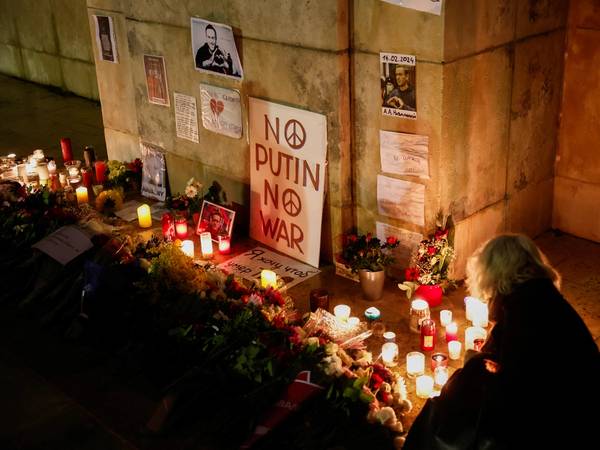In the annals of Russian history, few figures stand as tall as Alexei Navalny. His name has become synonymous with courage, resilience, and unwavering commitment to justice in the face of oppression.
From surviving a poisoning attempt orchestrated by the Kremlin, to boldly returning to Russia despite the risks, Navalny's journey embodies the spirit of defiance against tyranny.
Navalny's activism began long before his poisoning in August 2020. As a prominent anti-corruption crusader and political opposition leader, he had long been a thorn in the side of Vladimir Putin's regime. His relentless investigations into corruption at the highest levels of government exposed the rot at the core of Putin's rule, earning him both admiration and ire from supporters and adversaries alike.
But it was the brazen attempt on Navalny's life that catapulted him onto the international stage and transformed him into a symbol of resistance against Putin's authoritarian regime. Despite suffering near-fatal poisoning with Novichok, a deadly nerve agent, Navalny defied the odds and survived. His recovery, against all odds, was a testament to his resilience and determination to continue the fight for justice.
Navalny's return to Russia in January 2021, just months after his poisoning, further underscored his unwavering commitment to his cause. Despite the genuine threat to his life, he chose to confront his would-be assassins head-on, declaring, "I'm not afraid." His defiance in the face of danger inspired millions of Russians who yearned for change and galvanized a new wave of opposition to Putin's regime.
Navalny’s life and death has undoubtedly left a deep impression on activists facing tyrannical regimes around the world, including in Iran, where hundreds of dissidents suffer isolation and often torture in prisons. Many Iranians voiced outrage upon hearing the news of his passing in a Gulag prison, flooding social media with messages of support.
In his powerful courtroom speech during his trial, Navalny minced no words in condemning Putin and his cronies for their corruption and oppression. He spoke not just for himself but for the millions of Russians who have suffered under Putin's rule. His words were a rallying cry for those who refuse to be silenced by fear, a call to action for all who believe in democracy and human rights.
Navalny's court defense succinctly highlights his defiance against Putin's regime and his unwavering commitment to justice. He accuses Putin of orchestrating his assassination attempt, asserting that his persecution stems from Putin's fear and hatred towards him for surviving the attempt. Condemning Putin as a cowardly "little man in a bunker," Navalny accuses him of resorting to murder to maintain power and brands him as "Vladimir the Underpants Poisoner." He challenges the trial's intimidation tactics, asserting that locking up one man cannot instill fear in millions. Navalny pledges to continue fighting despite facing imprisonment and urges others to do the same, demanding proper justice and fundamental rights such as participation in elections and equitable distribution of national wealth.
Navalny's activism, however, did not go unchallenged. Putin's regime, notorious for its brutal crackdowns on dissent, spared no effort in trying to silence Navalny and his supporters. From arbitrary arrests and politically motivated prosecutions to the use of state-sponsored violence, the regime sought to crush any opposition to its rule.
But Navalny remained undeterred. His courage in the face of adversity inspired countless Russians to join the fight for freedom and justice. His message resonated with those who had long suffered under Putin's repressive regime, giving voice to their aspirations for a better future.
As we mourn Navalny's passing, we must also celebrate his life and legacy. His death in prison is a tragic reminder of the lengths to which Putin's regime will go to cling to power. But it is also a testament to Navalny's unwavering commitment to his principles and willingness to sacrifice everything for the cause of justice.
As we honor Navalny's memory, let us renew our commitment to the values for which he fought so tirelessly. Let us demand justice for Navalny and all those whom Putin's regime has silenced. And let us continue to pressure Putin and his chain of corruption until justice prevails and freedom triumphs.
Let us call for the free world to recognize the severity of the situation in Russia under Putin's rule, rejecting the notion that continued dialogue will lead to meaningful change and instead urging decisive action, including the non-recognition of the upcoming Russian election. International solidarity is needed in addressing the crisis in Russia. It is time for the free world to stand up to Putin's tyranny and demand justice for the people of Russia.
As Navalny famously stated in an Oscar-winning 2022 documentary about his life by Canadian director Daniel Roher, "If they decide to kill me, You're not allowed to give up. If they decide to kill me, it means that we are incredibly strong. We need to utilize this power not to give up, to remember we are a huge power that these bad dudes are oppressing."
As he asked, we can't lose hope and must continue the fight. Dictators never rest, and neither can we. Let us join together, wiping away our tears, and pick up where he left off, standing firmly for justice and freedom.
